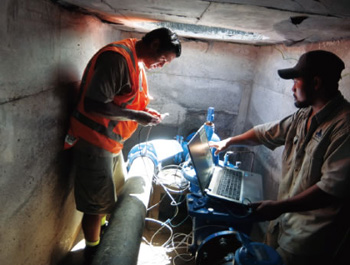Section 5 Development Cooperation through Collaboration with Diverse Actors
In recent years, the international environment surrounding ODA has been dramatically changing. For example, the economy is being globalized, many developing countries are under the spotlight as new investment destinations and markets, and private funds worth approximately 2.5 times ODA are flowing into developing countries. In the context of these changes to the environment, the form of international cooperation of Japan is also changing. At the same time, in the development of developing countries, activities not only by governments or international organizations but also by private companies and NGOs are increasingly important; furthermore local governments and small and mediumsized enterprises (SMEs) are also drawing attention as new development partners.
In that context, the role of ODA is also changing, and a variety of actors are working on the development of developing countries through various approaches utilizing their field of expertise. Rich approaches connecting each actor through ODA are expected to enlarge development effects by generating synergy effects.
For example, importance is now being placed on the role of private companies in achieving sustainable growth in developing countries. The increase in direct investment in developing countries leads to the transfer of technology and know-how to developing countries, and also leads to an increase in employment and income growth. Specifically, initiatives based on collaboration between the public and private sectors are important, including infrastructure development that leads to the improvement of the business environment of developing countries, development of the industrial human resources, assistance for BOP (Base Of the Economic Pyramid, refer to this) businesses, etc. Examples of this kind of public-private collaboration contributing to the economic development of developing countries include the project for industrial complex development, sales and operation in the Special Economic Zone on the outskirts of Yangon City in Myanmar, and the project for basic training of technical interns and engineers before dispatch to Japan and helping them to get a job after they return home at Japanese companies operating in Viet Nam.

Flow volume management being carried out by the Samoa Water Authority Urban Section Non-Revenue Water Countermeasures Unit as part of the “Capacity Enhancement Project for Samoa Water Authority in Cooperation with Okinawa” (see this) (Photo: Kenta Tomiyama / JICA)
Moreover, the role of the Japanese local governments in the same context is also increasingly important. In recent years, the economic development of emerging countries, particularly in Asia, has been remarkable at times, but on the other hand due to the rapid economic development and progress of urbanization, the need for responses to urban problems such as water, energy, waste management, urban traffic, pollution, and disaster risk reduction has been growing rapidly, and it is expected that the large amount of expertise and know-how accumulated by the Japanese local governments will be helpful for the development challenges of developing countries. Cases of this type in which the Japanese local governments utilized ODA to address these challenges in developing countries include the technical cooperation by Yokohama City to carry out the Water Supply System Improvement Project for Metro Cebu Water District in the Philippines, the JICA Partnership Program (JPP) by Miyakojima City of Okinawa Prefecture for the Water Supply Model Project in Samoa, etc.
Furthermore, NGOs are entities that can ascertain in detail the diverse issues and needs on the front line in developing countries and respond quickly in accordance with the situation, so they are typical actors of Japan’s “visible assistance” through citizen participation. Currently, the number of NGOs in Japan working on international cooperation activities is said to be over 400 (as of December 2016), and they are achieving steady growth. For example, recently the participation of NGOs in emergency humanitarian assistance to respond to conflicts in Iraq, Syria, its surrounding countries, Yemen, etc. and to largescale natural disasters such as the Nepal Earthquake, etc. has been attracting international attention.
NGOs are important partners for the government in development cooperation, and the Development Cooperation Charter states that the government will strategically strengthen partnerships with NGOs/civil society organizations (CSO).
MOFA is actively collaborating with NGOs as a part of securing the understanding and support of the Japanese people regarding development cooperation, and in order to implement ODA effectively. Under the Development Cooperation Charter, in June 2015 MOFA worked with NGOs to formulate the Medium-Term Plan stipulating the direction of collaboration over the next five years, and currently MOFA is endeavoring to implement the plan. The basic policies of the Medium-Term Plan with regard to collaboration between MOFA and NGOs are (i) cooperation with respect to funding for the development cooperation activities of NGOs, (ii) cooperation to enhance the capacities of NGOs, (iii) dialogue with NGOs regarding development cooperation policies and collaboration with NGOs, and (iv) collaboration with NGOs in development cooperation.
